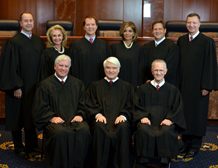© 2015 The Texas Lawbook.
By Janet Elliott
AUSTIN (April 20) – The Supreme Court of Texas recently upheld a 55-cent-per-pack tax on the makers of discount cigarettes, finding the Legislature had a rational basis to distinguish between small manufacturers and Big Tobacco companies that settled with the state in 1998.
The ruling overturns a decision by the 3rd Court of Appeals that held the 2013 tax violated the Texas Constitution’s requirement that taxes be equal and uniform. The court of appeals had said the Legislature’s laudable goals of recovering health care costs and curbing underage smoking did not allow it to differentiate among manufacturers of identical tobacco products.

The Supreme Court remanded the case to the court of appeals to consider other arguments, including that the tax was an improper attempt to protect Big Tobacco, which has been losing market share to discount manufacturers.
Writing for a unanimous court, Justice Don Willett said it was rational for the Texas Legislature to distinguish between the small tobacco manufacturers and the large companies that are paying $500 million annually to the state. The settling companies also operate under marketing and other restrictions not borne by members of the Small Tobacco Coalition, Willett said.
“Because no similar reimbursement mechanism was in place for [non-settling manufacturers], it was logical for the Legislature to recover those costs from NSMs whose products create the same health risks,” Willett said. “As a corollary, the Legislature could have reasonably determined that if NSMs did not bear the health care costs of their products, they could offer their products at prices substantially lower than the prices of settling manufacturers’ products, which would entice youth and undermine the goal of reducing underage smoking.”
Texas Attorney General Ken Paxton, whose office represented the state, praised the decision.
“Tobacco producers who have not taken responsibility for the ill-health effects of their products must not enjoy a competitive advantage over producers who do,” Paxton said in a statement.
Jay Maguire, a spokesman for the Small Tobacco companies, said the ruling set a “dangerous precedent for every industry doing business in this state.”
“If the equality and uniformity of taxation required by the Texas Constitution now means the Legislature can pick winners and losers, imposing a selective tax on identical companies with identical products, the only distinction being one set of companies settled claims of ‘really bad conduct,’ and the other having never been sued at all, then that provision of the Constitution is a dead letter,” Maguire said in a statement.
He said the coalition would consider pursuing relief on other constitutional matters left open on remand.
Business Group Weighed In
The Texas Taxpayers and Research Association, an Austin-based business group, had urged the Supreme Court to overturn the court of appeals ruling, saying it imposed a “novel and unprecedented standard for judging reasonableness” of a tax by looking at what is being taxed rather than who is paying the tax.
“Should such a ruling become final, the state’s tax system will be left in an economically destructive disarray,” said the association in a letter brief.
Willett said that the lower court did not follow recent precedent, including his court’s 2012 ruling in a constitutional challenge to the state’s franchise tax by food and drink giant Nestlé. Nestlé had argued that the franchise tax treats similar businesses in different ways, but the court found that the classifications were rationally based on the different burdens the businesses could bear.
“That distinction by analogy is even stronger here,” said Willett. “Whereas an employer in Nestlé could be subject to higher payments, the settling manufacturers are subject to higher payments.”
Craig Enoch, a former Texas Supreme Court justice, represented the Small Tobacco Coalition and Global Tobacco. He argued that the settlement punished companies for their pre-1998 conduct. The state argued that the ongoing annual payments are not punitive, but are reimbursements to the state for ongoing health care costs.
“We need not divine the role of those payments today, however because this is an Equal and Uniform Clause challenge, not a contract-interpretation dispute,” said Willett.
Texas Tax Similar to Minnesota
Texas joined with Florida, Minnesota, and Mississippi in its settlement with five large tobacco companies. The required payments cost those companies about 64-cents-per-pack.
In 2006, the Minnesota Supreme Court upheld a $50-cent-per-pack tax as rational and reasonably related to its goals of recovering health costs and reducing underage smoking.
In 46 other states where a national master settlement applies, escrow statutes require non-participating manufacturers to deposit annual fees that can be used by states to recover a judgment or settlement. Non-settling manufacturers have challenged those statutes on due process and equal protection grounds but every federal court to consider those challenges has rejected them, according to Willett’s opinion.
The case is Glenn Hegar, Texas Comptroller, and Ken Paxton, Texas Attorney General v. Texas Small Tobacco Coalition and Global Tobacco Inc., No. 14-0747.
© 2014 The Texas Lawbook. Content of The Texas Lawbook is controlled and protected by specific licensing agreements with our subscribers and under federal copyright laws. Any distribution of this content without the consent of The Texas Lawbook is prohibited.
If you see any inaccuracy in any article in The Texas Lawbook, please contact us. Our goal is content that is 100% true and accurate. Thank you.
